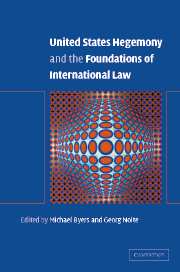Book contents
- Frontmatter
- Contents
- List of contributors
- Preface
- Introduction: the complexities of foundational change
- PART I International community
- PART II Sovereign equality
- PART III Use of force
- PART IV Customary international law
- PART V Law of treaties
- PART VI Compliance
- 16 The impact on international law of US noncompliance
- 17 Compliance: multilateral achievements and predominant powers
- 18 Comments on chapters 16 and 17
- Conclusion
- Index
16 - The impact on international law of US noncompliance
Published online by Cambridge University Press: 13 July 2009
- Frontmatter
- Contents
- List of contributors
- Preface
- Introduction: the complexities of foundational change
- PART I International community
- PART II Sovereign equality
- PART III Use of force
- PART IV Customary international law
- PART V Law of treaties
- PART VI Compliance
- 16 The impact on international law of US noncompliance
- 17 Compliance: multilateral achievements and predominant powers
- 18 Comments on chapters 16 and 17
- Conclusion
- Index
Summary
In one of the most influential theoretical works on compliance of the post–Cold War era, Abram Chayes and Antonia Chayes hypothesized a propensity for States to comply, rather than not, with international obligations. It is only infrequently, according to Chayes and Chayes, that a treaty violation falls into the category of a wilful flouting of legal obligation. Chayes and Chayes cite Robert Keohane's survey of two hundred years of American foreign relations, in which he identified only forty “theoretically interesting” cases in which there had been a serious issue as to whether or not to comply. And yet, in the decade since the end of the Cold War, the United States has met with criticism for its seemingly intentional violation of treaty obligations. The United States has not paid its bill to help run the United Nations, has used force contrary to the UN Charter, has failed to comply with the provisions of the Vienna Convention on Consular Relations, and has passed environmental legislation found to be incompatible with the global trading regime. The election of George W. Bush raised concern at the possibility of an even less respectful attitude on the part of the United States towards international law, as exemplified by the administration's determination to “move beyond” the Anti-Ballistic Missile Treaty in developing missile defense. Conduct of the war in Afghanistan and US treatment of captured Taliban and al-Qaida fighters have raised questions as to the degree of US respect for international humanitarian law.
- Type
- Chapter
- Information
- United States Hegemony and the Foundations of International Law , pp. 427 - 455Publisher: Cambridge University PressPrint publication year: 2003
- 3
- Cited by

